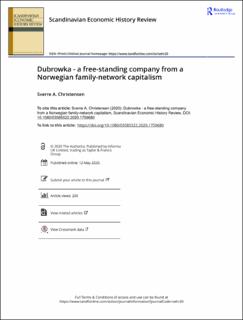| dc.contributor.author | Christensen, Sverre August | |
| dc.date.accessioned | 2021-06-14T10:55:36Z | |
| dc.date.available | 2021-06-14T10:55:36Z | |
| dc.date.created | 2020-06-15T16:33:26Z | |
| dc.date.issued | 2020 | |
| dc.identifier.citation | Scandinavian Economic History Review. 2020, 1-18. | |
| dc.identifier.issn | 0358-5522 | |
| dc.identifier.uri | https://hdl.handle.net/11250/2759253 | |
| dc.description.abstract | The first globalisation, in the decades around 1900, was propelled by free-standing companies. This article discusses the establishment of a Norwegian free-standing company in Russia in 1910. It was the culmination of an eastwards movement from the Norwegian forest industry that went through Sweden and Finland before reaching Russia. The article discusses who controlled the company, and how this changed over time. It makes two main contributions to the literature. Firstly, how a family network can solve some of the puzzles free-standing companies have posed to theories of international business, especially regarding the origins and internalisation of ownership advantages. Secondly, it shows that, although free-standing companies were important for the first global economy, they were also integral to the deglobalization that followed. | |
| dc.language.iso | eng | |
| dc.title | Dubrowka - a free-standing company from a Norwegian family-network capitalism | |
| dc.type | Peer reviewed | |
| dc.type | Journal article | |
| dc.description.version | publishedVersion | |
| dc.source.pagenumber | 1-18 | |
| dc.source.journal | Scandinavian Economic History Review | |
| dc.identifier.doi | 10.1080/03585522.2020.1759680 | |
| dc.identifier.cristin | 1815576 | |
| cristin.ispublished | true | |
| cristin.fulltext | original | |
| cristin.qualitycode | 2 | |
